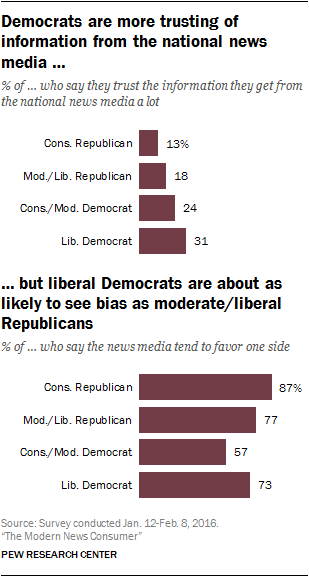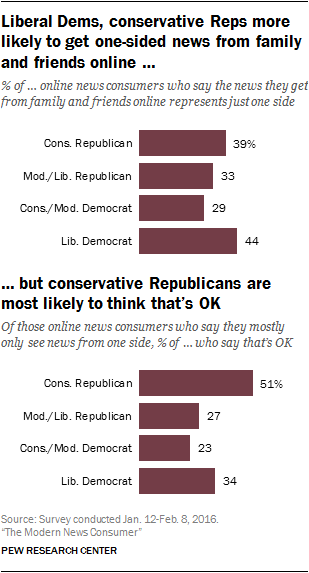Democrats overall express more trust than Republicans in the information they get from national news organizations.

- Fully 31% of liberal Democrats and 24% of conservative/moderate Democrats trust information from national news organizations a lot (vs. 13% of conservative Republicans and 18% of moderate/liberal Republicans).
- As noted earlier, conservative Republicans are the most likely to say the news media tend to favor one side (87%) and conservative/moderate Democrats are the least likely (57%). At the same time, though, about three-in-four liberal Democrats (73%) see news media bias, about equal to moderate/liberal Republicans (77%).
Online, those at either end of the ideological spectrum are somewhat more likely to get one-sided news from family and friends; Conservative Republicans are most likely to be OK with it. But both sides see personal contacts as an important news source.

- Among online news consumers, roughly four-in-ten conservative Republicans (39%) and about as many liberal Democrats (44%) say news they get from family and friends online represents just one side, outpacing the more moderate members of each party.
- But about half (51%) of conservative Republicans who said they see mostly one-sided news say this is OK, exceeding all other political groups, including liberal Democrats (34%).
- The Center has seen similar differences across the ideological spectrum in the past. In our 2014 report on political polarization and media habits, we found that half of consistent conservatives say they only talk politics with other conservatives, while liberals were most likely to drop a friend because of politics.
- These differences emerge despite the fact that both sides are about equally likely to consider friends and family an important source for news. Liberal Democrats are, however, somewhat less likely to say friends and family are the most important way they get news (5%, compared with 10% or more among the other groups).




